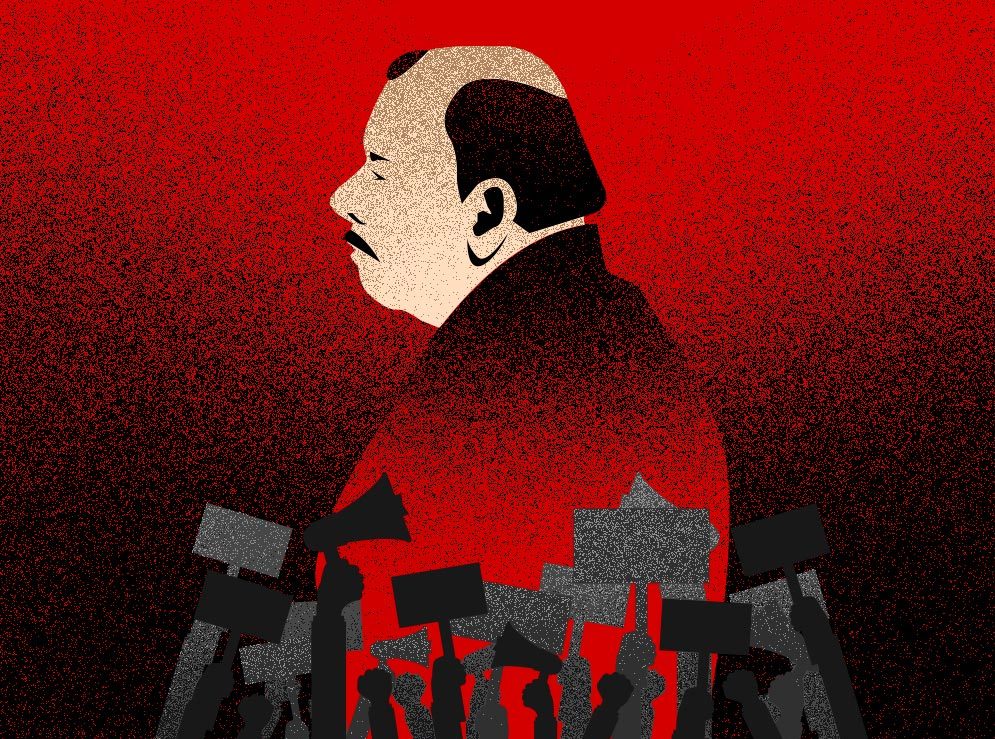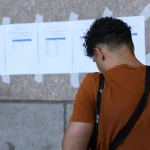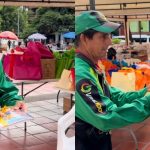Andrés Marenco recalls that on April 19, 2018, he met, along with some 20 other people, at a gas station in Juigalpa, Chontales. They did it to protest against the Social Security reforms, but above all outraged by the violence exercised by Sandinista mobs against the elderly and students who had protested in León and Managua. Unlike those other cities – attacked by police, mobs and members of the Sandinista Youth – they were beaten up by a group of state workers called by the ruling Sandinista National Liberation Front (FSLN).
A day later, says Marenco, “we were 300 people claiming.” He was studying third year of Civil Engineering at the National University of Engineering (UNI) and was convincing his parents to support him in starting a cafeteria. However, four years later he reflects that those two days were the beginning of a total change in his life and in that of Nicaragua as a whole.
On August 10 of that year they prevented him from entering the university. “He was already expelled without any explanation, the guard had my name on a list,” he says.
Marenco did not expect that to happen to him, although he acknowledges that within the universities since before 2018 there was already “a dictatorship” that “punished those who thought differently.”
“Since April 2018, Daniel Ortega and Rosario Murillo have wanted to silence the students because they represent the strength of citizen protests and it was shown that they could not silence us in the face of crimes and brutal repression,” he says.
He had two years left to finish his university career and because he had gone out to protest he was left unable to finish his studies. He is now in exile in Costa Rica and has not been able to formally study again, although he has taken several courses to earn a living. “Even graphic designer with what I learned basic I have done,” he confesses.
This young man hopes to study next year. “It’s difficult because you live in another country, far from your family and the only thing I have that proves my studies is my student card and some photographs inside the university. They left me without any academic records,” he laments.
A similar situation was experienced by Yarithza Mairena, who only had five classes left to graduate from her Political Science degree at the National Autonomous University of Nicaragua (UNAN-Managua) when the protests of the April Rebellion began and for her participation she was expelled to the as well as more than 150 young people.
Due to his belligerence in the defense of university autonomy, Mairena became one of the most visible faces of the student struggle. “The National Union of Nicaraguan Students (UNEN) does not represent us,” she shouted at a conference on May 7, 2018. Three months later she was imprisoned. She remained in the dungeons of the dictatorship for seven months.
For Mairena, university autonomy had already been curtailed long before 2018, but as of that date “the total and totalitarian control they had became more evident”, so much so that the National Council of Universities (CNU) itself “became part of the violence against students.
Four years later, he values that the situation “has worsened” and lists as proof of this the cancellation of private universities, the persecution against students and the limitation of spaces for debate. “Questioning inside the enclosures is not allowed. An indoctrination has been imposed”, he denounces.
“They want to avoid any attempt to protest”
For Jonathan López, protesting also meant being expelled from his Economics degree and becoming a political prisoner. He appreciates that the Ortega-Murillo regime wants to “silence critical voices at any cost” and that is why it has closed universities, has left the Central American University (UCA) without a budget, has expelled students, fired teachers and has reformed the University Autonomy Law to align the study houses to their own interests.
“University autonomy has only remained a name because in practice there is not a single indication that shows us the opposite; what they have done is create fear in the students and try to impose the idea that anyone who tries to rebel will suffer the consequences, ”he says.
López says that the regime’s recipe is “prison, expulsion or death” and that is why they attacked the students “so brutally.”
For López, one of the mistakes made by the regime has been that “they underestimate the courage of young university students.”
“If they believe that everything they have done is going to silence us, they are totally wrong and although many are silent it does not mean that they have forgotten or that they are in favor of a criminal dictatorship,” he says.
“Maritza,” a recent UCA graduate who prefers to withhold her name for safety reasons, was involved in the 2018 protests from the earliest days. She was also part of the protest cells of that house of studies. “We kept alive in some way, although without going out into the streets, the citizen protests, although due to the same persecution, the covid-19 pandemic and the generalized fear of incarceration, they were fading,” she admits.
However, he points out that the universities “continue to be bastions of resistance” although “there is discouragement and fear”.
“The flame of the Rebellion is still alive, even if it doesn’t express itself because they won’t let us,” he reflects.
Coercion in the classrooms
The direction that higher education is taking in Nicaragua “is worrying,” values university student Elthon Rivera, who has been left without studying twice since 2018.
First they stole his dream of being a doctor and he was expelled from UNAN-Managua, where he was in the fifth year of his career, and this year, after the closure of the Paulo Freire University, he was left unable to continue his Political Science degree.
“They have tried to remove any critical thinking from university students, who have been silenced and most have chosen to accept silence as a way of survival,” he details.
Although he knows that the FSLN exercised control of the universities before 2018, he confesses that before “there was a little freedom of formation” and “there was no obligation, like now, to position party issues or ban things that could not be discussed. ”.
“Today the coercive power is inside all the universities, inside the classrooms, there is an espionage system (…) there is a silence, but it is a make-up, because, although the voice is not raised, nobody agrees with the regime “, He says.
Rivera believes that “a farce of the regime to indulge itself” has been imposed on the universities.
“They want to believe that they have the population submissive, but fear is not always synonymous with inaction,” he says.
“Many are still in hiding”
Yunova Acosta was part, since April 2018, of the Student Movement of the National Agrarian University (UNA), and assures that the “flame” of the protest is still alive in the campuses, although many students died, others had to go into exile, some they are imprisoned and there are also those who continued with their lives “as they could”.

“Many of those who participated in the protests are still involved from underground, because we know that they are monitoring us for being opponents,” he says.
Acosta admits that the regime has tried to instill fear, but maintains that “this continues to fail them.” In addition, he acknowledges that when they became involved with opposition organizations, they perceived that the culture of the caudillo “was still present, especially in adults.”
“Go continue studying and leave the political to us adults,” he says they were answered many times. However, she is sure that all young people are convinced of the need for real change and want “a new way of doing politics.”
Yarithza Mairena mentions that “an adultism” has prevailed within the opposition itself and on repeated occasions they responded that autonomy was one of “the issues for later.”
“But we have already seen how the regime has attacked the universities after the protests because it is a way to control and silence the students who represented the visible face of the protests. That is why we believe that both the agenda of justice, democracy and the reform of university autonomy should be a priority”, he insists.
Mairena values as false that the university community has been away or asleep from the reality of the country before the protests. “The FSLN had its arms mobilized within the precincts, but the discontent with them was already enormous and proof of this is that there was always an enormous abstention in their selection processes,” she remarks.
“The new generations are also dissatisfied”
Mairena admits that today there is still a diversity of student movements. “But it is something that is needed, because the plurality of organizational spaces is one of our struggles,” she clarifies.
“What fails is that there is no accurate dialogue or a way to agree on the demands of the student body. There is no work table,” she says.
He adds that they maintain a “dialogue with active students and new generations of university students”, but “it is natural that we continue to see the same faces because we have already lost everything and face the dictatorship without the fear that many have”.
In this, Elthon Rivera agrees, for whom the new generations of university students who began their education after 2018 “have been renewed”, despite the fact that “they have been received with deception, surveillance, espionage” that makes it difficult to see new faces of protest .
“It is normal – he reflects – that many have also moved away or do not want to be involved because they see that those of us who have protested have sacrificed a lot and have lost years of our lives”.
















